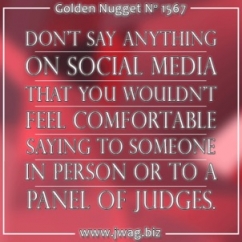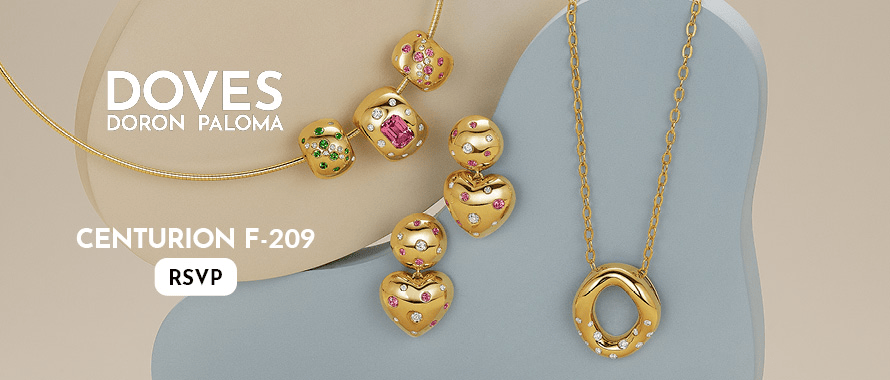Sales Strategy
Seven Points Of Social Media Etiquette | July 30, 2017 (0 comments)

Totowa, NJ—At left is Golden Nugget #1567, a cardinal rule of social media. At the JA NY show on Monday July 24, 2017, it was my honor to sit on the panel discussion about social media etiquette. The panel was moderated by Ashley Davis, associate editor of National Jeweler. The other three panelists I sat with were Levi Higgs, Archives and Social Media Manager with David Webb; Joy Butler, transactional business lawyer and author of The Cyber Citizen's Guide Through the Legal Jungle; and Dino Kuckovic, customer experience manager with Falcon.io.
Expert panels are usually brought together to foster discussions and surface different points of view. I've watched, and even participated in, previous panels where the experts had to agree to disagree in order to prevent heated arguments on stage. Many of the panel discussions I've attended have provided a dense concentration of information that would otherwise take hours to find and read on my own.
I felt that Ashley Davis did a great job at selecting the panelists for this social etiquette discussion. Joy Butler brought the legal point of view, Levi Higgs shared experiences of managing the social media presence for a large brand, Dino Kuckovic brought his experience of working with a software platform that manages social media accounts, and I am part owner of a website and marketing agency that manages social accounts for clients.
The following is a recap of the seven questions that were asked during the panel discussion and the main points of how we each answered them.
1. What are the ground rules for running your social media account?
Joy took the lead in answering this first question and explained that you should never violate anyone's rights, whether it is copyrights, trademarks, or publicity rights or offering a promotion that does not comply with local laws. Specifically, you shouldn't use photography of celebrities without permission, even if you took the photos yourself. Any promotion you run online must be offered for free and not require a purchase of any kind, otherwise it's considered a lottery. Additionally, if you are working with a social media influencer, and you pay them to post for you, then that post must be disclosed as a paid ad, otherwise you are not complying with FTC regulations.
The main ground rule I offered for this question was to explain that you should think about what you are saying before you click that post button. Everything you post should further your brand image in some positive way. Don't post an opinion about something if it is your personal opinion and has nothing to do with business. Keep your personal opinions on your personal accounts and your business information on your business accounts. If you use your personal accounts for business then you need to keep hot-topic opinions off your personal account as well.
I also explained that you need to be aware that social media gives us the opportunity to build a world brand and sell to other countries. Each culture around the world has a different view of humor and irony. What you might find humorous or ironic in the United States might seem very cruel or self-centered in other countries. It's best to keep attempts at humor and irony off your social media business profiles.
Dino suggested that the best ground rule for social media is to reread what you wrote before posting. Be kind and courteous and never spam other people or complain about what others are doing.

Matthew Perosi, jWAG
2. How does an established brand or business adopt social media while avoiding trouble and maintaining an authentic voice online?
Levi took the lead on this question as the social media manager for David Webb, a well-established luxury jewelry brand. He explained that there is a wealth of archive history for David Webb and it's enjoyable to share the history of the company, accomplishments over time, the beliefs of, and what David Webb did while he was alive, and reprising old ads. Fans and followers have enjoyed the occasional stroll down memory lane and it helps to establish the longevity of the company.
Dino explained that brands and businesses have a fear of social media because there's a lot of user-generated content that can be overwhelming, and perhaps the brand fears losing control. If the owners and the content creators are working together to portray the company history, then that becomes a solid foundation for the future. You can show people where you were yesterday versus where you are today, and that your values still apply.
While Levi and Dino both explained the benefit of company owners working in cooperation with their marketing teams, I explained that several large and small brands have gotten themselves into trouble with ads that weren't properly vetted. Sometimes the marketing team will attempt to dovetail from current events with a quick ad that wasn't reviewed by other departments or people. Something as small as a tweet or as big as a video commercial could backfire on a company if the idea is not properly vetted. Even small businesses or solopreneurs could ask for the honest opinion of their friends and family before creating an ad that attempts to correlate or mimic current events.
3. Is it okay to vent online, and if so, how do you do it without causing controversy or getting yourself into trouble?
Joy brought up a very good legal point while answering this question. She said we are legally allowed to post our opinion, insult, rant, and vent about other people or products. It's even legal to set up a blog or a website or social media account devoted exclusively to criticizing or insulting a particular person, organization or product you don't like. What you can't do is cross the line into libel or defaming someone. That line is crossed when you make a false statement about them or harm their reputation. In order to be classified as libel it must be a statement that can objectively be categorized as false or as true. Legally, nasty opinions are okay to post, but it doesn't make it a good practice.
Levi has a subtle way of dealing with negative comments on Instagram. He usually replies to all comments on social media, but he ignores the negative comments.
Much of the venting I see online is very nasty and heavily opinionated in one direction. Simply stated, it's cyber bullying, and that's exactly what I called it during the panel. Many of us would never have the courage to say, in person, what we have the courage to type on a social media comment. What we say and how we interact with others, whether friend, loved one, or business colleague, helps to shape our character and how others view us. If you spend all your time online posting negative opinions, then you're likely to come across as a grumpy person that no one really wants to deal with.
Additionally, the nasty words you say to someone else will have an effect on their thoughts, what they do that day, and how they live the rest of their lives. Even the shortest of negative comments can ruin a person for a while. Just don't do it.
Dino added that people who vent online don't usually feel better after venting. It's just another anger outlet that doesn't help them, especially if no one replies to their negative comments. Dino brought up the question on whether or not it's a good idea to delete negative comments, because when you delete bad comments you always run the risk of angering the person even more. My own suggestion is to hide comments on Facebook instead of deleting them. Levi suggests caution when deleting a comment and to weigh the pros and cons for each situation before deleting.
Instead of deleting bad comments, Levi, Dino, and I also suggested another approach to leave the comment for the public to see but add a reply and offer for the person to call you so you can resolve the issue. It's impossible for every business to be perfect 100% of the time, and future customers might judge you based on how you interact with others while under negative pressure.
4. Should you vent on your private social media account?
Many jewelers and designers have business social media accounts that the public can see and private social media accounts that are shared with friends, family, business colleagues, and even a few customers. Ashley wanted us to share our thoughts on the best ways to use a personal account.
This is another area where there's a fine line between how you mix business with pleasure through your social media accounts. If you are the owner of the business or the spokesperson for the business, then it's important to realize that you always represent your brand regardless where and when you appear, and regardless what social media account you are using.
Larger companies probably have their own social media etiquette policy for their employees, and they probably monitor our personal accounts for any derogatory comments about their fellow employees, managers, or the company in general. Employees can be fired if they disclose confidential information online.
As a small business owner, you are probably using your personal social media accounts to promote your business in some way. If not directly, you probably have social connections with people you work with or other trade professionals. If you over-share or complain on social media you will risk alienating some other trade professionals. While you might not care what other people think of you, consider that a lot of the sales leads small businesses get are actually business referrals from friends and colleagues.
Over-sharing on social media can lead to lower levels of respect by your peers and eventual loss of business. When it comes to your personal accounts, as a small business owner you simply should not post strong opinions of people or competitors.
5. Should a brand post about a social or political issue that they feel very aligned with?
Politics and social issues are hotbed topics that are tricky to mention on social media without offending half of the people following you.
Businesses should not take openly take sides on an issue unless they are willing to accept the potential loss of business. Businesses should appear neutral whenever possible, unless the issue at hand is pertinent to the products and service you offer.
If you do choose to post something political or related to social issues, then try to include both sides of the argument to help further educate your followers and appear to remain neutral.
6. Although online bickering happens a lot, how do you handle a situation that might grow into an online argument?
Joy cautions that there are times when online bickering might lead to a lawsuit. If you find yourself in a situation where litigation might eventually be needed, then you should request to take the conversation offline and talk to the person directly. Social media posts can be used in court proceeding if the court deems it to be relevant.
Dino suggests that a brand could get involved with the online bickering if it is a stance that the company supports. There are times when a brand might feel they are on the right side of history and are willing to alienate their customers to do what they feel is right. Don't get involved with online bickering unless you truly believe in what you want to say.
I've seen a lot of online bickering where everyone involved is verbally attacking. They use words like "you're wrong" or "you did this wrong" or some other phrasing that indicates their superiority over someone else's feelings or knowledge. This type of wording is a direct attack against someone else. Instead, use phrasing like "I feel" or "in my opinion" or "in my experience" which will convey your point of view just as well, but without personal attacking someone else.
Your choice of words will either incite further argument or lead to positive discussions.
7. How do you get yourself out of a social media mishap whey you find yourself caught in the middle of one?
Levi stressed that, if you truly made a mistake, then supplicate yourself and apologize immediately in a professional and succinct statement.
Dino added that the statement needs to be blunt and honest, but it doesn't have to be a written statement. You can use different formats of social media, like video, photos, and even podcasts, to help humanize your brand during the apology. This approach will help people realize that you are only human and you do make mistakes, and perhaps it will be forgotten about.
I explained that sometimes the social media manager accidentally posts something that is their opinion rather than the supported position of the company they work for. In these cases, it's important for the person responsible to accept responsibility and quickly tell the public that they made a mistake that doesn't represent the brand properly.
I also recommend that you avoid posting any opinions, humor, witticisms, or attempts at irony right before long periods that you might be disconnected from the Internet. Some examples include right before bed, before getting on an airplane, or going for a trip in a known cell phone dead zone. It's easy for your post to go viral if followers misconstrue your attempts at humor, wit, irony, or to disagree with your opinion while you are unplugged and offline, at which point you have a lot of damage control that could have been avoided.
Final Thoughts. Although we each had a different background, I was surprised how similar our answers were. As I sat down to write this Golden Nugget post, I started thinking that, when it comes to social media etiquette, there is a clear distinction between what is right and what is wrong. It was an honor to be chosen for this panel and to offer the current guidelines for etiquette.
I'm aware that etiquette does change from generation to generation, and that what we do in the future could be completely different than how we conduct ourselves today. Hopefully you'll find the above advice useful.
Matthew Perosi first got online in 1988 and began his website programming career in 1994. His long experience with the Internet give him a unique perspective of how and why things work on websites and social media. His core values focus on using his extensive knowledge to build enterprise level website solutions at affordable prices for small businesses. Matthew is the guy you turn to for correct answers when you are frustrated with the poor results you are getting from the high cost of your website and online marketing. Visit Matthew's company website www.SapphireCollaborative.com or reach him at (888) 872-0274 or email matthew@sapphirecollab.com






